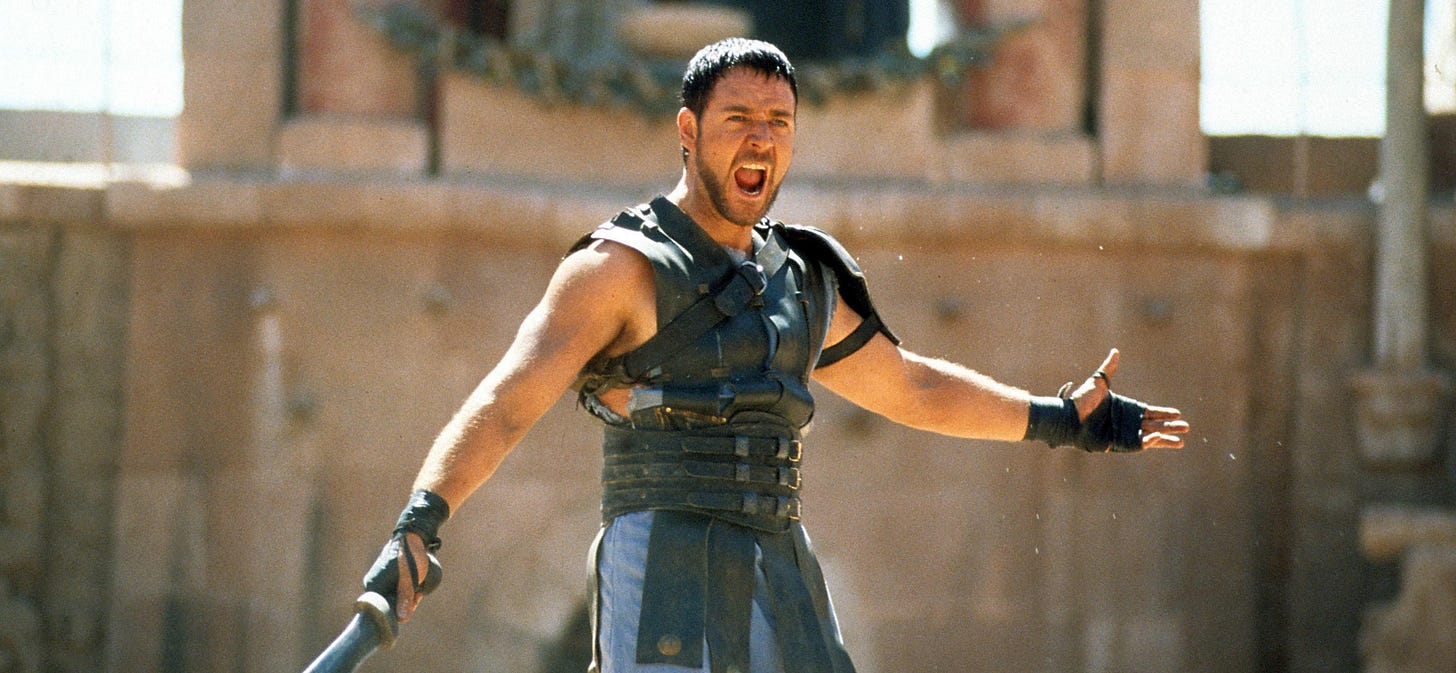We strike the first quarter of the twenty-first century today. Those who lived it can now claim to have been there for a beat of history. This latest was arguably among the most chaotic, consequential beats there’s been. But it’s impossible to really know; for you can only hear the ones you’re in.
How does one measure the points of history’s arc? It is a difficult question, further complicated by the fact that our present moment is defined by an inability to agree on values and measurements. If we can’t concur on what makes a civilization great, then arguing the matter will only prove counter-productive to the goal of strengthening it.
It seems a different approach is needed for judging the progress and prospects of our age. For this, I propose we look to the greatness of our Gladiators.
The interval we examine began in the spring of 2000 when Gladiator became among the most successful films of the year raking in cash and awards. I personally saw it four times in theaters. The film defined an era not just for Hollywood but for the culture writ large, for Hollywood was then a hegemon occupying the nucleus of popular culture. Russell Crowe’s star power gravitas as Roman General Maximus was as undeniable as the answer to his famous rhetorical challenge. We were entertained.
Just shy of 25 years later, Gladiator II seems far less confident in the arena of our time. With rare exceptions, the multiplexes are largely abandoned as would be tentpoles collapse under the weight of their marketing budgets. Each year, fewer and fewer bother to watch the distribution of laurels at award ceremonies.
Not that Hollywood can’t still pull off the occasional spectacle. Much to the relief of studio actuaries, Gladiator II performed to par with the box office gross of its predecessor. It was a fun film and the crowd, fickle though they may be, seems pleased. But the barbarians have already crashed the gates. Amidst hordes of unwashed influencers, it can be hard to tell the difference between the film’s star Paul Mescal and, say, Jake Paul.
It is the latter after all who has the stronger claim to being a modern day gladiator. His victory over Mike Tyson was the most streamed sporting event ever with an estimated viewership of 108 million, more than the population living under Roman rule at the peak of the empire. But scale is not the issue so much as quality. As anyone who watched that sad bout can attest, it was a rather pitiful display in which a fading legend was knocked off his pedestal by an opportunistic internet prankster.
And can there be a better metaphor for our age? The ranks of those who are exalted are increasingly comprised of not serious people. From world leaders to the world’s richest man, a primary preoccupation is the further accumulation of attention and internet clout rather than grand achievement, good deeds, and the progress of people. So much for “strength and honor”, the most surefire way for today’s gladiators to rise to prominence is to start an OnlyFans.
“But our technology,” you say. “We have rockets that can launch AND land, robot cars, virtual assistants, and rovers on Mars!” Some of that is cool, no doubt, but let us examine it in the context of our exercise. Which of the two Gladiator films looked better? For all the supposed advancements in computer generated imagery in 25 years, those CGI baboons and sharks were a travesty, apparent even from the trailer, that only distracted from the film. Compared with the practical effects used when Maximus wrestled tigers in the original, we see how technology is now undermining that which it is supposed to uplift. We have always been constrained by technology’s limitations but our increasing reliance on it is sapping our creativity and eroding the very foundations upon which society is built. Artificial Intelligence not only pollutes our sources of knowledge with hallucinations but consumes so much water, energy, and rare earth minerals as to be a threat to our climate.
All empires grow tired, decadent, corrupt, and eventually fall. Ours is no different, but this fate need not be cause for despair. For people continue on. And that is where surprise and possibility can be found. For all its faults, Gladiator II still gave us the macabre delight of Denzel Washington strutting about in robes carrying the severed head of an emperor.
What this moment lacks in sense and predictability, it will more than make up for in drama and stakes. It is the pinnacle of empire when chance and happenstance are most potent and human frailty carries the greatest consequence.
Being present in any time is in and of itself a gift, even more so for those who can capture its contradictions, indulge its ironies, and revel in its wonders. Whether the summit of human endeavors lies before us or behind us is a moot point when it comes to the choices we face as individuals. I for one, look forward for taking up the pen more in this new quarter-century if only to record the sensation of civilizational collapse, but more hopefully to capture whatever moments of greatness may rise from the ruins of what has been.
For while the gladiators are the objects of glory, it is the bards who tell their story. What we do in life, echoes in eternity, but it can only be heard by the beat of history.




